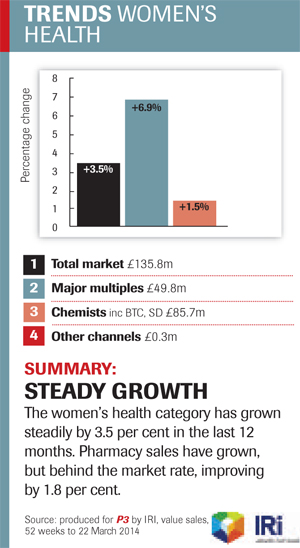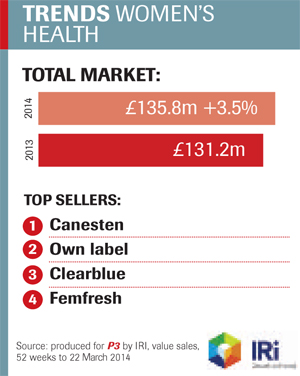Women this way
In Healthy living
Follow this topic
Bookmark
Record learning outcomes
Women form the majority of community pharmacy's customer base, but can more be done to help them navigate the shelves and find the products they need?
Statistics show that women are more likely to use primary care services than men: not only do they visit a GP on average six times per year compared with four visits for men, but they are much more familiar with the inside of a pharmacy, too €“ an average of 18 visits per year compared with men's four.

Many women's health problems are still seen as embarrassing to discuss, and although brands are trying to reduce the embarrassment factor of purchasing items such as incontinence products, it's vital that pharmacy staff are sensitive, and trained to look for 'tell-tale' signs of conditions that women might feel reluctant to talk about.
Market analysts IRI estimate the women's health market at over £135 million, and one that is growing in pharmacy. What is the news from women's health brands and do they have some suggestions for meeting women's needs in store?
In the zone
Creating a 'Women's Zone' in the GSL section of the pharmacy is one way pharmacies can increase visibility and footfall to women's health product areas, suggests the brand team for Canesten, increasing visibility and driving sales for products such as thrush relief. 'Placing Canesten in the GSL has been very successful in pharmacies that have gone down this route, along with merchandising Canesten and other women's health products together.'
The brand is currently running a TV campaign, for Canesten Combi with the strapline 'You wouldn't shampoo your hair without conditioning, so why not use a combination thrush treatment?'. The advert will be on screen until June.
Canesten's healthcare profession website will soon be relaunched with e-training modules, downloadable print training material and useful information on Canesten, at www.canesten. co.uk/hcp.
The brand has also launched its own dedicated YouTube channel that talks about all things thrush and intimate health, see www.youtube.com/canestenwomenshealth. A series of eight short and accessible videos answer common questions about thrush, including symptoms, prevention and treatment. Three new intimate health product launches are expected from Canesten later in 2014.
Key category growth
Bladder weakness is a common problem for women and remains one of the fastest growing categories in pharmacy, and TENA is leading the category with 78 per cent market share. Many women are still embarrassed about buying products to help, though, according to Donna Wilson, TENA training and brand manager.
'Many women are opting to purchase bladder weakness products in a pharmacy, but for some it remains a topic that causes undue embarrassment and a reluctance to seek advice. As such, it is particularly important that pharmacists feel knowledgeable and confident when approaching a customer to offer their assistance and support.'
The brand has undergone improvements in packaging to try and encourage women to feel more at ease while purchasing the products, but it's still extremely important that pharmacy staff can open up a dialogue with the customer to reassure them that their experience is normal and that they are purchasing the correct TENA product. 'Familiarity with the different causes and types of bladder weakness, along with substantial product knowledge, will help pharmacy staff initiate conversation.'
Ms Wilson also advises that women buying large volumes of sanitary protection might be experiencing bladder weakness, and suggests that pharmacy staff are aware of this, so that they can suggest more appropriate products to help.
Life stage support
There was a reported 25 per cent increase in the menopause remedies market last year, driven by an ageing population and more knowledge of supplements and natural health products.
Many women choose natural products to help them manage their symptoms and, according to women's health supplement brand Promensil, which carried out a survey of more than 500 women, 65 per cent preferred a natural treatment and 17 per cent said they would not consider HRT due to worrying about side effects.
 Menopause specialist nurse Kathy Abernethy, comments: 'If a woman chooses a natural approach, I suggest she looks at isoflavones, in particular Red Clover isoflavones which can take the edge off common symptoms. It is important women opt for a trusted brand such as Promensil and look for the optimum level of Red Clover, which is 80mg, as this dosage has been clinically researched to help menopausal women.'
Menopause specialist nurse Kathy Abernethy, comments: 'If a woman chooses a natural approach, I suggest she looks at isoflavones, in particular Red Clover isoflavones which can take the edge off common symptoms. It is important women opt for a trusted brand such as Promensil and look for the optimum level of Red Clover, which is 80mg, as this dosage has been clinically researched to help menopausal women.'
Herbal remedy company Bioforce's managing director Dr Jen Tan believes that menopause is one of the areas that many women prefer to at least try the natural approach before turning to a GP. The company distributes and markets the A.Vogel range.
'There has been a greater interest from consumers in the use of herbal remedies for treating minor ailments. This has been encouraged particularly by the Traditional Herbal Medicinal Products Directive, which allows registered or licensed herbal remedies claims on their packaging, promotional material and website or e-marketing. Hence, it is now much easier to legally communicate the benefits of herbal products and because of this, brands such as A.Vogel have been investing heavily in reaching out directly to consumers.'
Spring and summer consumer campaigns are planned for A.Vogel Menoforce Sage tablets, suggested to help relieve excessive sweating associated with the menopause.
Herbal products have a 'real complementary role' to play in the pharmacy, suggests Dr Tan. 'Often they fill real therapeutic gaps and should not just be seen as an alternative taken by patients with an aversion to conventional medicines.'
Sleep Success
Insomnia is a symptom of menopause that not only causes distress in isolation, but can worsen other symptoms. As progesterone and oestrogen levels are disrupted, sleep can be a casualty for many women, and to compound the issue, the more sleep lost to secondary to menopausal symptoms, the more pronounced insomnia symptoms become.Sleep success
For women trying to deal with hormone- related insomnia, a sleep aid might help. LanesHealth has launched a new addition to its traditional, herbal range €“ Kalms Night, which replaces Kalms Sleep. The new product will sit alongside Kalms Night One-A-Night, Kalms Tablets and Kalms Day Pocket Pack to create stand-out on shelf and in store with the recognised Kalms logo, branding and purple colour palate.
Nikki Kerrigan, brand manager for Kalms Night, says: 'The traditional ingredients of Kalms Night can provide an effective herbal remedy for sleep, when getting a good night's rest can feel like a struggle.'
Weight worries
With an estimated 63 per cent of the UK adult population classed as overweight or obese, weight loss supplements remain a popular buy. Weight can be a difficult subject to discuss with image-conscious customers, but according to brand managers from XLS Medical, it's essential that pharmacists and their staff feel confident talking to consumers about the weight loss support that is available to them.
'Dieters may be wary of using a weight loss aid, but clearly presenting clinical evidence behind products will reassure potential customers about the role they can play in effective and sustainable weight loss.'
 Weight loss support purchases are likely to be research based, so pharmacists and pharmacy assistants can maximise sales by being able to give in-depth advice and insight into other customers' experience. Not only will this encourage the customer to see pharmacy teams as a source of knowledge but will also help inform and increase the chance of repeat purchase. 'Pharmacy teams play an important role in advising customers about weight loss and should be prepared to answer a variety of questions.'
Weight loss support purchases are likely to be research based, so pharmacists and pharmacy assistants can maximise sales by being able to give in-depth advice and insight into other customers' experience. Not only will this encourage the customer to see pharmacy teams as a source of knowledge but will also help inform and increase the chance of repeat purchase. 'Pharmacy teams play an important role in advising customers about weight loss and should be prepared to answer a variety of questions.'
XLS-Medical Fat Binder has become a £10 million brand in one year, and is the UK's number one weight loss tablet. The product was voted Slimming Product of the Year in a survey of more than 11,000 consumers.
Omega Pharma has developed a weight management training module to help pharmacists and pharmacy assistants. Available at www.omegapharmatraining.co.uk, the training focuses on category information and advice, scenario based learning and recommendations of weight loss supports such as XLS-Medical Fat Binder and XLS- Medical Carb Blocker to help dieters reach their goals.
Comment
 Lila Thakerar, Shaftesbury Pharmacy, Harrow 'I think that women are most aware of maintaining healthy lifestyles and their physical health and presentation. This is an excellent opportunistic category as women tend to visit pharmacies more than they see their doctors. Of course, the challenge for community pharmacy is the competition in the category from health food shops and supermarkets, but this can be fought with the clinical confidence of professional advice from the pharmacy personnel. Correct training of staff and adequate display of supplements will undoubtedly enhance sales and this is something that we take seriously. We do recommend vitamin supplements to women who we suspect do not have a healthy lifestyle €“ my faith in the use of antioxidants is always reflected with the recommendations I make to customers.'
Lila Thakerar, Shaftesbury Pharmacy, Harrow 'I think that women are most aware of maintaining healthy lifestyles and their physical health and presentation. This is an excellent opportunistic category as women tend to visit pharmacies more than they see their doctors. Of course, the challenge for community pharmacy is the competition in the category from health food shops and supermarkets, but this can be fought with the clinical confidence of professional advice from the pharmacy personnel. Correct training of staff and adequate display of supplements will undoubtedly enhance sales and this is something that we take seriously. We do recommend vitamin supplements to women who we suspect do not have a healthy lifestyle €“ my faith in the use of antioxidants is always reflected with the recommendations I make to customers.'
 Dilip Patel, Mirage Pharmacy, Handsworth, Birmingham 'The biggest challenge in the women's health category in community pharmacy is confidentiality with problems such as thrush. Even the menopause is something that most women wouldn't like to talk about openly in a busy pharmacy. Some women ask if they can speak to me discreetly and I'll see them in the consultation room. Another challenge for us is the lack of space to stock a good range of well-displayed products. We do counter training with Numark and there's usually topics related to women's health in that, which we go through with the staff. It is an important category, covering everything from period pains to going through the menopause and thrush, which is a large market.'
Dilip Patel, Mirage Pharmacy, Handsworth, Birmingham 'The biggest challenge in the women's health category in community pharmacy is confidentiality with problems such as thrush. Even the menopause is something that most women wouldn't like to talk about openly in a busy pharmacy. Some women ask if they can speak to me discreetly and I'll see them in the consultation room. Another challenge for us is the lack of space to stock a good range of well-displayed products. We do counter training with Numark and there's usually topics related to women's health in that, which we go through with the staff. It is an important category, covering everything from period pains to going through the menopause and thrush, which is a large market.'
 Alan Bradley, Cornwell's Chemist, Stoke-on-Trent 'This category contributes a large proportion to our overall over-the- counter sales, much more than for men's health. I believe this to be due to greater openness and willingness to discuss healthcare issues that we see from women compared with men. As well as offering general advice when women ask, we can also give advice for the relief of symptoms and issues related to pregnancy, menstruation, period pains, hair problems, etc. I believe the biggest way that sales in this category could be improved would be the licensing of more over-the-counter products for use in pregnancy and breast feeding.'
Alan Bradley, Cornwell's Chemist, Stoke-on-Trent 'This category contributes a large proportion to our overall over-the- counter sales, much more than for men's health. I believe this to be due to greater openness and willingness to discuss healthcare issues that we see from women compared with men. As well as offering general advice when women ask, we can also give advice for the relief of symptoms and issues related to pregnancy, menstruation, period pains, hair problems, etc. I believe the biggest way that sales in this category could be improved would be the licensing of more over-the-counter products for use in pregnancy and breast feeding.'
